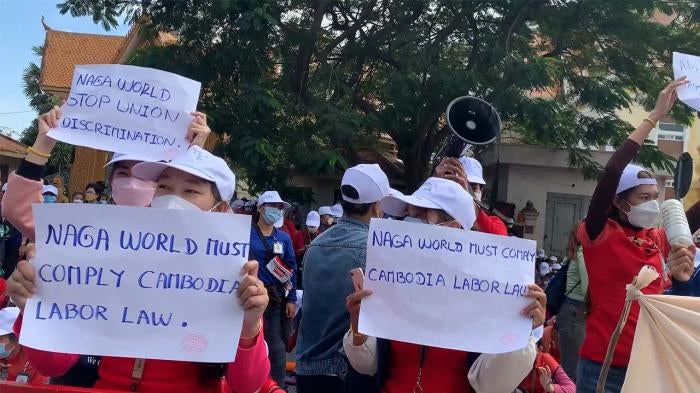Cambodia: Union Busting
Read a text description of this video
Narration:
These are scenes of workers from the NagaWorld Casino in Phnom Penh, Cambodia being assaulted by security forces for going on strike. They were also being forced onto buses and abandoned on the outskirts of the city. Workers went on strike after the company laid off more than 1300 people during the Covid recession.
Many of those dismissed were union leaders and activist members, greatly weakening the union.
Khun Tharo, Program Manager, CENTRAL, Labor Rights Group
This case at NagaWorld is one which we see as a serious case of labour rights violations by the employer, using its influence and power to undermine the union.
Narration:
The European Union and the US are among Cambodia’s largest export markets.
They should press the Cambodian government to protect the rights to freedom of association to strike, and to collective bargaining.
Chhimm Sithar, President, Labor Rights Supported Union of Khmer Employees of NagaWorld (LRSU)
My name is Chhim Sithar and I'm the President of the Labor Rights Supported Union of Khmer Employees of NagaWorld (LRSU).
I was present at the strike.
Around ten men without uniforms ran and grabbed me, pulling me back and forth in a rough way. They didn't show a warrant and took me to the police station. The next day I was questioned by a judge on charges of incitement and causing serious social insecurity was sent to Correctional Center 2 [Phnom Penh’s prison facility] for nine weeks.
Khun Tharo, Program Manager, CENTRAL, Labor Rights Group
We've seen both local and national union leaders and activists be targeted when those union leaders have stood for and protected workers’ rights and working conditions during the COVID-19 crisis when companies close, or suspend or lay off workers.
Narration:
When workers are laid off, the union representatives are entitled to stand up for their rights.
Yang Sophorn, President, Cambodian Alliance of Trade Unions (CATU):
The problem at Violet [garment factory] occurred after the factory closed without paying proper severance to workers according to the labor law. When I exercised my right as
a trade union leader of CATU [Cambodian Alliance of Trade Unions] to go and support our members and workers participating in the strike the Ministry of Labour threatened me that if I continued to support the Violet workers' strike they would remove CATU's registration. These are threats aimed at frustrating workers exercising their rights to demand what they should've received according to the law.
Narration:
Countries importing Cambodian goods should set clear benchmarks for the Cambodian government to honor its labor rights obligations.
(Bangkok, November 21, 2022) – The Cambodian government has used the Covid-19 pandemic to jail union activists, restrict union registration, and block the right to strike in the garment and tourism industries, Human Rights Watch today said in a report released today. The authorities have also permitted employers to evade labor regulations and engage in unfair labor practices in violation of Cambodian and international law.
The 97-page report, “Only ‘Instant Noodle’ Unions Survive: Union Busting in Cambodia’s Garment and Tourism Sectors,” documents how the Cambodian government and some employers have used various legal and administrative tactics during the Covid-19 pandemic to weaken Cambodia’s independent union movement and violate workers’ rights. Measures adopted to address the severe economic impacts of the pandemic have punished independent unions while benefitting employer-friendly unions, which could register quickly with the government, like “making instant noodles,” in the words of a prominent union leader.
